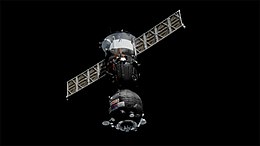Soyuz MS-16
 Irkutapproaches the ISS | |
| Mission type | Crewed mission to ISS |
|---|---|
| Operator | Roscosmos |
| COSPAR ID | 2020-023A |
| SATCATno. | 45465 |
| Mission duration | 195 days, 18 hours and 49 minutes |
| Spacecraft properties | |
| Spacecraft | Soyuz MSNo.745Irkut[1][2] |
| Manufacturer | RSC Energia |
| Launch mass | 7,280 kg (16,050 lb) |
| Crew | |
| Members | |
| Start of mission | |
| Launch date | 9 April 2020, 08:05:06UTC[3] |
| Rocket | Soyuz-2.1a(B15000-042)[1] |
| Launch site | BaikonurSite 31 |
| Contractor | RSC Progress |
| End of mission | |
| Landing date | 22 October 2020, 02:54:12 UTC[4] |
| Landing site | Kazakh Steppe,150 km (93 mi) southeast ofZhezkazgan |
| Orbital parameters | |
| Reference system | Geocentric orbit[5] |
| Regime | Low Earth orbit |
| Inclination | 51.66° |
| Docking withISS | |
| Docking port | Poiskzenith |
| Docking date | 9 April 2020, 14:13:18 UTC[5] |
| Undocking date | 21 October 2020, 23:31:41 UTC[5] |
| Time docked | 195 days, 9 hours and 18 minutes |
 Cassidy, Ivanishin, Vagner | |
Soyuz MS-16was aSoyuzspaceflight launched on 9 April 2020,[3]which transported three members of theExpedition 62/63crew to theInternational Space Station.[6]
This flight was the first crewed launch using theSoyuz 2.1alaunch vehicle, and the first crewed Russian mission not to launch fromGagarin's Start(which began modernization renovations afterSoyuz MS-15) sinceSoyuz MS-02in 2016.[7]
Crew[edit]
| Position | Crew member | |
|---|---|---|
| Commander | Expedition 62/63 Third and last spaceflight | |
| Flight Engineer 1 | Expedition 62/63 First spaceflight | |
| Flight Engineer 2 | Expedition 62/63 Third and last spaceflight | |
Backup crew[edit]
| Position | Crew member[5] | |
|---|---|---|
| Commander | ||
| Flight Engineer 1 | ||
| Flight Engineer 2 | ||
Crew notes[edit]
This flight would have marked the first spaceflight for rookie cosmonautNikolai Tikhonov,who has been removed from several ISS flights due to delays to the RussianNaukalaboratory module starting withSoyuz MS-04.Tikhonov and Babkin were replaced by their backups, Ivanishin and Vagner, for medical reasons.[8]Tikhonov, the original Soyuz commander, suffered an eye injury, and Russian officials opted to swap both Russian crew members with the back-up crew.[9]
Tikhonov and Babkin were expected to fly onSoyuz MS-17,scheduled for October 2020 when Tikhonov's eye injury was set to have had healed, although the two were not assigned to this mission. Tikhonov has since retired from roscosmos,[10]while Babkin remains an active cosmonaut, but he has not yet been assigned to a future spaceflight.
Due to theCOVID-19 pandemic,the crew's families and media representatives could not watch the launch in Baikonur, and the usual pre-launch traditions dating back toYuri Gagarin's flight onVostok 1were canceled.[9]
Mission[edit]
Soyuz MS-16 was launched on 9 April 2020 at 08:05:06 UTC. The Soyuz 2.1a booster's first and core stage engines ignited on time and lifted the rocket away from its firing stand at theBaikonur Cosmodrome,with cosmonautAnatoli Ivanishin,joined by the rookieIvan Vagneron the left and astronautChris Cassidyon the right. Like Ivanishin, Cassidy is making his third space flight. NASA AdministratorJim Bridenstinetweeted congratulations: "Chris Cassidy, Anatoly Ivanishin and Ivan Vagner are safely in orbit, no virus is stronger than the human desire to explore. I'm grateful to the entire @NASA and @roscosmos teams for their dedication to making this launch a success".
TheInternational Space Stationpassed directly over the launch site about three minutes before the launch and the booster climbed directly into the plane of its orbit. Six orbits after that, at 14:13:18 UTC, the Soyuz docked at thePoiskdocking compartment.[11]
Return[edit]
The Soyuz capsule undocked from the International Space Station at approximately 23:32:00 UTC and landed in the steppes of Kazakhstan at 02:54:12 UTC.[4][12][13]
References[edit]
- ^abNavin, Joseph (4 March 2020)."Preparations continue amid crew shuffle for Soyuz MS-16".NASASpaceFlight. Archived fromthe originalon 20 June 2020.Retrieved20 June2020.
The Soyuz 2.1a built specifically for the Soyuz MS-16 mission is B15000-042 (V15000-042) [...] The serial number for the specific Soyuz spacecraft that is going to be flown on MS-16 is No.745.
- ^Gebhardt, Chris (8 April 2020)."Russia conducts first Soyuz 2.1a human launch; MS-16 crew arrives at Station".NASASpaceFlight.Archivedfrom the original on 20 June 2020.Retrieved20 June2020.
Soyuz will use the call sign "Irkut" for this mission, after the river Commander Ivanishin's home city is named after
- ^ab"Утвержден экипаж космического корабля" Союз МС-16 ""[The crew of MS-16 Soyuz spacecraft has been approved] (in Russian). Interfax. 27 June 2019.Archivedfrom the original on 3 June 2020.Retrieved28 August2019.
- ^abClark, Stephen (21 October 2020)."Live coverage: Soyuz crew returns to Earth".Spaceflight Now.Archivedfrom the original on 26 October 2020.Retrieved22 October2020.
- ^abcdBecker, Joachim (20 February 2020)."Soyuz MS-16".spacefacts.de.Archivedfrom the original on 15 January 2020.Retrieved20 February2020.
- ^Becker, Joachim (20 February 2020)."ISS: Expedition 62".spacefacts.de.Archivedfrom the original on 16 May 2020.Retrieved20 February2020.
- ^Becker, Joachim (20 April 2018)."Soyuz MS-02".spacefacts.de.Archivedfrom the original on 19 December 2019.Retrieved14 January2020.
- ^Clark, Stephen (19 February 2020)."Russian space agency replaces cosmonauts on next space station crew".Spaceflight Now.Archivedfrom the original on 20 February 2020.Retrieved20 February2020.
- ^abClark, Stephen (20 March 2020)."Astronaut's family won't attend launch next month due to coronavirus threat".Archived fromthe originalon 22 March 2020.Retrieved22 March2020.
- ^"Cosmonaut Nikolai Tikhonov leaves Roscomos - collectSPACE: Messages".www.collectspace.com.Retrieved30 July2021.
- ^Clark, Stephen (10 April 2020)."Soyuz crew docks with International Space Station".SpaceflightNow.Archivedfrom the original on 25 May 2020.Retrieved10 April2020.
- ^Space com Staff 21 (22 October 2020)."Watch live tonight: Soyuz capsule to return ISS crew to Earth".space.com.Archivedfrom the original on 22 October 2020.Retrieved22 October2020.
{{cite web}}:CS1 maint: numeric names: authors list (link) - ^Neal, Mihir; Gebhardt, Chris (21 October 2020)."Soyuz MS-16 returns Space Station trio to Earth".NASASpaceFlight.com.Archivedfrom the original on 24 October 2020.Retrieved22 October2020.



